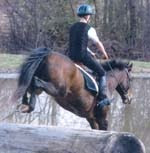
In 2005 I managed a horse farm with over 100 horses that was placed under quarantine for 11 very long weeks due to an outbreak of the equine herpes virus. Prior to this outbreak, like most other horse owners, I wasn't aware of how easy it is for a horse to pass this virus on to an entire farm. It is very possible that a horse who came for one of the shows we hosted could have "dropped off" the virus when it coughed on a gate, or a fence post. It is equally possible a horse who came through for a trial left it behind, or that one of the school horses we had on the farm was a latent carrier of the disease.
I was naive in thinking we were safe because all our horses were vaccinated religiously. For everything. Like clock work. Silly me. When the first three horses died in the days leading up to the largest 3 day horse show we held each year, I felt like someone had misled me. We were so cautious about vaccinating new horses as soon as they arrived, and keeping our own horses on a strict schedule, I just didn't know how it was possible this could happen. But it did.
Because it happened as show horses were being trailered onto our property, and because we were the largest riding facility within hundreds of miles, it was one of the most public outbreaks of the equine herpes virus the state of Maryland had ever experienced. We lost six horses in that outbreak. Six horses who were teachers, the stars of our stables, horses and ponies who had carried hundreds of children and adults on their backs and taught them how to ride. For those of us who worked at that riding school, they were our pets, our family, and we mourned their loss deeply. It was a very sad time.
But like all dark clouds, we learned from that experience. We learned about proper quarantine procedures, we learned never to let our horses drink from a public water trough at another farm. We learned it is possible the lack of sunlight through the winter diminishes the horses immune system and can cause this virus to rear its ugly head, and we learned that even the best vaccination practices, the best feed, the most love and the best care, it can happen to anyone, on any farm. In a riding school like ours, with over 100 horses stabled in four barns, bacteria and virus's are everywhere. Horses that are kept outside in a more natural setting and in the open air are less likely to catch something from another horse like that.
As the days get dark earlier, as we head toward winter which is when most of these outbreaks occur, I think of those horses we lost:
Aviva, Bailar, Gem, Shaggy, Winter and Cherry. I will remember them always.
I also remember the old horse we almost lost, Radar. It was only because of the round the clock care of his loving owner, the delivery of a sling to hold Radar upright when his legs failed him, and the team effort of our barn workers, the vets, the other boarders and students who pitched in to help, that Radar still lives today. He is retired now, living the good life in green pastures where his owner, Bill, still visits him every day. I will get an update on Radar and will write about him soon.
In the meantime, put bottles of antiseptic pumps between each stall at your farm and use it all the time to clean your hands. Be sure your horses are vaccinated because it does help minimize the severity of a disease, even if it doesn't prevent it. If possible, put winter lights in your barn to compensate for the lack of sun in the winter, and quarantine all new horses for a minimum of 14 days, but preferably 21 before allowing them to mingle with the others. Ask for vaccination records of all horses coming onto your property, and the second a horse shows signs of illness, remove them to your quarantine area for the duration.
 This was too cute not to share. Tugboat and Ceara did their first Beginner Novice Event last weekend. If you look closely at his hindquarter, Ceara scooped a heart shape out of his trace clip.
This was too cute not to share. Tugboat and Ceara did their first Beginner Novice Event last weekend. If you look closely at his hindquarter, Ceara scooped a heart shape out of his trace clip.

+of+DallasGrazing.jpg)


